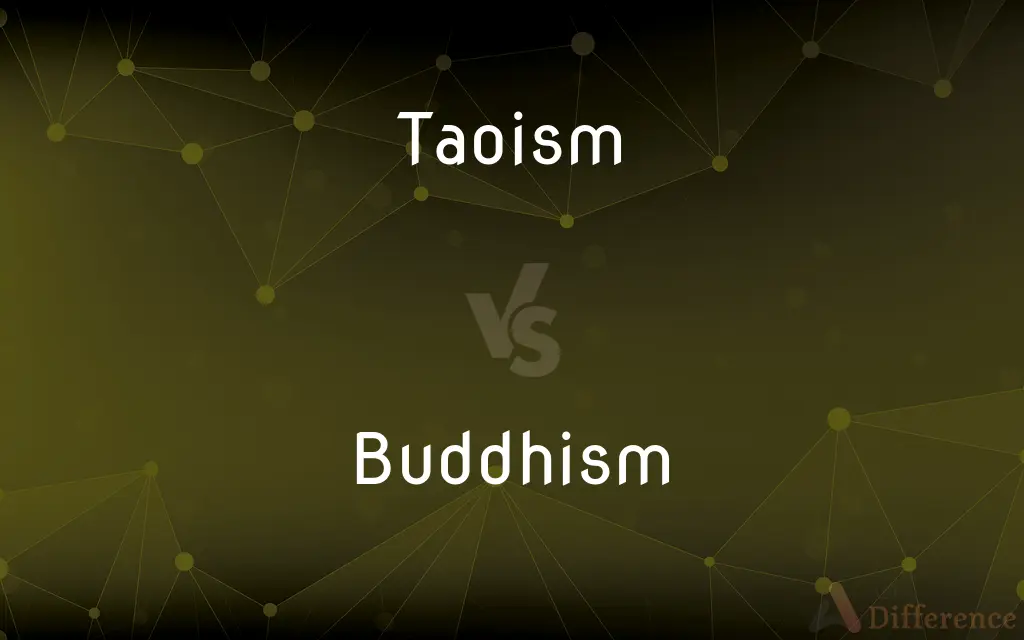Taoism vs. Buddhism — What's the Difference?
By Tayyaba Rehman — Updated on October 30, 2023
Taoism emphasizes living harmoniously with the "Tao," a fundamental principle that is the source of all existence, while Buddhism focuses on the pursuit of enlightenment and the alleviation of suffering.

Difference Between Taoism and Buddhism
Table of Contents
ADVERTISEMENT
Key Differences
Taoism and Buddhism* are two major religions originating from East Asia, each with its unique philosophy and practices. Taoism, originating from China, emphasizes living in harmony with the Tao. The Tao is often described as the indescribable essence of the universe, the fundamental principle underlying everything, yet not entirely graspable. On the other hand, Buddhism, founded in India by Siddhartha Gautama (Buddha), stresses the Four Noble Truths and the Eightfold Path, guiding individuals toward enlightenment and the alleviation of suffering.
In their worldview, Taoism often promotes the concepts of wu wei (non-action) and yin and yang (complementary opposites), encouraging a balance in life and a flow with nature. Buddhism, conversely, revolves around the ideas of karma (cause and effect), samsara (cycle of rebirth), and nirvana (liberation from the cycle of rebirth).
While Taoism primarily flourished in China and some parts of East Asia, Buddhism spread extensively across Asia, resulting in diverse schools and interpretations. For Taoists, immortality and longevity are of interest, and many practices involve meditation, alchemy, and rituals to achieve these. In Buddhism, meditation is also pivotal, but it's directed towards understanding the self, achieving enlightenment, and helping others do the same.
At the core of Taoism is the Tao Te Ching, attributed to Laozi, a foundational text full of wisdom and advice on leading a life of balance. Buddhism, meanwhile, refers to the Tripitaka or Pali Canon, encompassing the teachings of the Buddha and guidelines for monastic life.
Comparison Chart
Origin
China
India
ADVERTISEMENT
Primary Focus
Harmony with the Tao
Enlightenment and alleviation of suffering
Key Concepts
Tao, Wu Wei, Yin and Yang
Four Noble Truths, Eightfold Path, Karma, Samsara, Nirvana
Spread
Primarily in China and some parts of East Asia
Across Asia
Foundational Texts
Tao Te Ching
Tripitaka or Pali Canon
Compare with Definitions
Taoism
An ancient practice focusing on the principles of wu wei (non-action) and the balance of yin and yang.
The concept of yin and yang, central to Taoism, represents the interconnectedness and balance of opposites in the universe.
Buddhism
A tradition focusing on personal spiritual development and the attainment of a deep insight into the true nature of life.
Many are drawn to Buddhism for its emphasis on introspection and personal growth.
Taoism
A Chinese philosophy based on living in harmony with the Tao.
Many scholars study Taoism to understand ancient Chinese thoughts on balance and harmony.
Buddhism
A path teaching the cessation of suffering through self-awareness and ethical conduct.
Through Buddhism, practitioners learn the importance of compassion, mindfulness, and moral discipline.
Taoism
A path that emphasizes simplicity, patience, and compassion in life.
Adherents of Taoism often practice meditation and rituals to align themselves with the natural flow of the universe.
Buddhism
A widespread Asian religion emphasizing the impermanence of life and the interconnectedness of all beings.
Followers of Buddhism engage in meditative practices to gain insight into the transient nature of existence.
Taoism
A philosophical system teaching that harmony is found by aligning with the natural course of things.
Through Taoism, many learn the importance of living a life that doesn't go against the natural order of things.
Buddhism
A system of beliefs revolving around the Four Noble Truths and the Eightfold Path.
The core teachings of Buddhism offer guidance on leading a righteous and fulfilling life.
Taoism
A religious tradition originating from China emphasizing spirituality, immortality, and balance.
Many individuals turn to Taoism for its spiritual practices and rituals that promote longevity and inner peace.
Buddhism
A religion and philosophy based on the teachings of Siddhartha Gautama (Buddha) aiming for enlightenment.
Buddhism provides a path for individuals to achieve a state of inner peace and wisdom.
Taoism
Taoism (), or Daoism (), is a philosophical and spiritual tradition of Chinese origin which emphasizes living in harmony with the Tao (Chinese: 道; pinyin: Dào; lit. 'Way', or Dao).
Buddhism
Buddhism (, US: ) is an Indian religion based on a series of original teachings attributed to Gautama Buddha. It originated in ancient India as a Sramana tradition sometime between the 6th and 4th centuries BCE, spreading through much of Asia.
Taoism
A Chinese philosophy based on the writings of Lao-tzu, advocating humility and religious piety.
Buddhism
A widespread Asian religion or philosophy, founded by Siddartha Gautama in north-eastern India in the 5th century BC.
Taoism
A principal philosophy and system of religion of China that is based on writings attributed to Lao Tzu, Chuang Tzu, and others, and advocates conforming one's behavior and thought to the Tao.
Buddhism
The teaching of Siddhartha Gautama that life is permeated with suffering caused by desire, that suffering ceases when desire ceases, and that enlightenment obtained through right conduct, wisdom, and meditation releases one from desire, suffering, and rebirth.
Taoism
One of the popular religions of China, sanctioned by the state.
Buddhism
The religion represented by the many groups, especially numerous in Asia, that profess varying forms of this doctrine and that venerate Siddhartha Gautama.
Taoism
A Chinese sect claiming to follow the teaching of Lao-tzu but incorporating pantheism and sorcery in addition to Taoism
Buddhism
The religion based upon the doctrine originally taught by the Hindu sage Gautama Siddartha, surnamed Buddha, "the awakened or enlightened," in the sixth century b. c., and adopted as a religion by the greater part of the inhabitants of Central and Eastern Asia and the Indian Islands. Buddha's teaching is believed to have been atheistic; yet it was characterized by elevated humanity and morality. It presents release from existence (a beatific enfranchisement, Nirvâna) as the greatest good. Buddhists believe in transmigration of souls through all phases and forms of life. Their number was estimated in 1881 at 470,000,000.
Taoism
Religion adhering to the teaching of Lao-tzu
Buddhism
A religion represented by the many groups (especially in Asia) that profess various forms of the Buddhist doctrine and that venerate Buddha
Taoism
Popular Chinese philosophical system based in teachings of Lao-tzu but characterized by a pantheism of many gods and the practices of alchemy and divination and magic
Buddhism
The teaching of Buddha that life is permeated with suffering caused by desire, that suffering ceases when desire ceases, and that enlightenment obtained through right conduct and wisdom and meditation releases one from desire and suffering and rebirth
Taoism
Philosophical system developed by of Lao-tzu and Chuang-tzu advocating a simple honest life and noninterference with the course of natural events
Common Curiosities
How did Buddhism originate?
Buddhism originated from the teachings of Siddhartha Gautama, known as the Buddha, in ancient India.
How do Taoism and Buddhism view suffering?
Taoism sees suffering as a result of not living in harmony with the Tao, while Buddhism sees it as a part of existence, explained by the Four Noble Truths.
What is the primary goal of Taoism?
Taoism seeks harmony with the Tao, emphasizing balance, simplicity, and naturalness.
What's the primary difference between Taoism and Buddhism?
While Taoism emphasizes harmony with the Tao and the balance of nature, Buddhism focuses on enlightenment and the cessation of suffering.
What is the Tao in Taoism?
In Taoism, the Tao is an indescribable principle, the ultimate reality, or the underlying nature of all things.
What is the central text of Buddhism?
The central texts of Buddhism are the Tripitaka or Pali Canon, containing the teachings of the Buddha and guidelines for monastic life.
Is Taoism a religion or a philosophy?
Taoism can be both; it's a philosophy based on the ideas in the Tao Te Ching and also a religion with rituals and deities.
Does Taoism believe in reincarnation?
While Taoism does have concepts of life after death and immortality, it doesn't emphasize reincarnation as prominently as Buddhism.
Are there gods in Taoism?
Yes, Taoism has a pantheon of deities and spirits, often worshipped in rituals and ceremonies.
Is meditation a part of both Taoism and Buddhism?
Yes, both Taoism and Buddhism incorporate meditation as a means to spiritual growth and self-understanding.
Does Taoism have moral precepts like Buddhism?
While Taoism doesn't have a defined set of moral precepts like the Five Precepts in Buddhism, it does emphasize virtues like simplicity, humility, and compassion.
Who is the founder of Taoism?
While there isn't a singular founder, Laozi, the author of the Tao Te Ching, is often regarded as a foundational figure in Taoism.
How does Buddhism view the self?
Buddhism teaches the concept of "anatta" or "anatman," meaning "not-self," suggesting there's no unchanging, permanent self or soul.
What are the main branches of Buddhism?
The main branches of Buddhism are Theravada, Mahayana, and Vajrayana.
Are Taoism and Buddhism compatible?
Many individuals and communities integrate practices and beliefs from both Taoism and Buddhism, suggesting a level of compatibility between the two.
Share Your Discovery

Previous Comparison
Saloon vs. Sedan
Next Comparison
Field vs. TradeAuthor Spotlight
Written by
Tayyaba RehmanTayyaba Rehman is a distinguished writer, currently serving as a primary contributor to askdifference.com. As a researcher in semantics and etymology, Tayyaba's passion for the complexity of languages and their distinctions has found a perfect home on the platform. Tayyaba delves into the intricacies of language, distinguishing between commonly confused words and phrases, thereby providing clarity for readers worldwide.














































